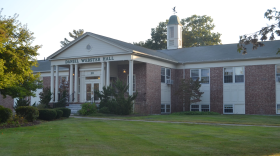María Martinez and her 16-year-old U.S.-born daughter Yareni live in Nashua. They usually run errands together because Martinez doesn’t speak English. Yareni and her sisters are the ones in charge of translating forms and talking with doctors because their mom does not trust interpreters.
“I call her my secretary because she helps me deal with all my businesses,” she says. “She understands my Spanish.”
Yareni feels she has a great responsibility even though she is not always confident in her skills.
“[I feel] kinda insecure about how I speak Spanish because I am not really good at it,” she says.
Still, Yareni tries hard to preserve her parents' language, and Spanish classes at school help her.
Her mom is among the 80% of US Latinos who think it is extremely important future Hispanic generations speak Spanish, according to a recent survey from the Pew Research Center. She is also among the 20% who say that a person must speak Spanish to belong to Latino culture.
Although Yareni says she is not that good in Spanish, she proudly identifies as a Latina; she’s part of the 78% of Latinos who think language doesn't define their relationship to their identity.
“As long as you try your best to speak in both languages,” she said. For her, it’s not about speaking Spanish perfectly, but using it in her daily life.
The Pew Research Center survey found around 25% of U.S. Latinos don’t speak Spanish and half of them have heard jokes and comments against them coming from family and friends for not speaking fluently.
Dominican José Ramon Menendez lives in Nashua. He has three children who speak mostly English but understand Spanish. He says as they grew up and went to school they lost their fluency in Spanish. But they don’t feel less Latino because of that.
“You have to teach children [they are Latinos], a lot of families don’t do it,” he says. “Even if you were born here or grew up with Americans, you can’t deny your race.”
In Menendez’s house, everyone speaks Spanglish. It’s a way Latinos from different generations, and with different language fluency levels, can understand each other. He uses words like carpeta for carpet, or rufo for roof and finds it amusing how his language has changed since he first arrived two decades ago.
Like him, 40% of Latinos nationwide use Spanglish often, and second-generation and bilingual Hispanics like his kids are most likely to do it often. For Menendez, the important thing is that his kids feel comfortable speaking at home and feel free to call themselves Latinos.
“Grown-ups speak Spanish and they speak English,” he said. “But we all understand each other.”








